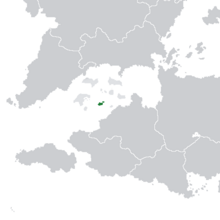Carucerean Ziba: Difference between revisions
m (Planita13 moved page Caruceran Ziba to Carucerean Ziba) |
mNo edit summary |
||
| (4 intermediate revisions by the same user not shown) | |||
| Line 1: | Line 1: | ||
[[Category:Carucere]][[Category:Languages]][[Category:Languages (Kylaris)]] | [[Category:Carucere]][[Category:Languages]][[Category:Languages (Kylaris)]] | ||
{{Infobox language | {{Infobox language | ||
| name = | | name = Carucerean Ziba | ||
| nativename = ''Gauzaba'' | | nativename = ''Gauzaba'' | ||
| states = [[Carucere]] | | states = [[Carucere]] | ||
| Line 11: | Line 11: | ||
| fontcolor = white | | fontcolor = white | ||
| fam1 = Zibaic | | fam1 = Zibaic | ||
| fam2 = | | fam2 = [[Ziba]] | ||
| fam3 = | | fam3 = Eastern Ziba | ||
| iso2 = | | iso2 = | ||
| iso3 = gau | | iso3 = gau | ||
| Line 21: | Line 21: | ||
| mapcaption = Location map of Carucere, where Gauzaba is spoken | | mapcaption = Location map of Carucere, where Gauzaba is spoken | ||
}} | }} | ||
''' | '''Carucerean Ziba''', known locally as '''''Gauzaba''''' (lit. ''bitter language''), is a language that evolved in the [[Colony of Saint-Brendan]] from the Eastern dialect of the [[Ziba|Ziba language]] used by the [[gowsa]] and their descendants in modern day [[Carucere]]. After the first arrivals of the gowsa in the 1850s, Gauzaba gradually began to develop distinguishing characteristics during the course of the late 19th and early 20th centuries. A recognized minority language in Carucere, it is estimated that about 15% of the population of the country continues to speak the language on a daily basis, although the number of casual speakers is estimated to be far higher. Gauzaba is considered by most linguists to be a partially creolized language, rather than a fully creolized one. | ||
An estimated 90 to 95% of the vocabulary is of Ziban origin, although Gauzaba has adopted words from other languages, | An estimated 90 to 95% of the vocabulary is of Ziban origin, although Gauzaba has adopted words from other languages, especially the {{wp|French language|Gaullican}} and the old Bahian creole. Since then [[Papotement]] has become a major source of influence. Nonetheless, there are a few key differences with Ziba, including more {{wp|Analytic language|analytic}} morphology and grammar than {{wp|Agglutinative language|agglutinative}}, and a spelling that reflects Gauzaban pronunciation rather than standard Ziba. Still, Gauzaba is largely mutually intelligible with most Ziba dialects, especially in spoken form. | ||
Gauzaba is the second most widely spoken native language in [[Carucere]], behind [[Papotement]]. About 10% of Carucereans, almost all Gosa-Carucereans, speak Gauzaba as their first language. However it is widely spoken and understood as a second or third language by | Gauzaba is the second most widely spoken native language in [[Carucere]], behind [[Papotement]]. About 10% of Carucereans, almost all Gosa-Carucereans, speak Gauzaba as their first language. However it is widely spoken and understood as a second or third language by a significant majority of Gosa-Carucereans. The language is widely used during Gosa cultural and religious events, and remains an important part of Gosa culture and identity. | ||
Latest revision as of 17:05, 5 December 2022
| Carucerean Ziba | |
|---|---|
| Gauzaba | |
| Native to | Carucere |
Native speakers | ~250,000 |
Zibaic
| |
| Solarian using the Gauzaba alphabet. | |
| Official status | |
Recognised minority language in | |
| Language codes | |
| ISO 639-3 | gau |
 Location map of Carucere, where Gauzaba is spoken | |
Carucerean Ziba, known locally as Gauzaba (lit. bitter language), is a language that evolved in the Colony of Saint-Brendan from the Eastern dialect of the Ziba language used by the gowsa and their descendants in modern day Carucere. After the first arrivals of the gowsa in the 1850s, Gauzaba gradually began to develop distinguishing characteristics during the course of the late 19th and early 20th centuries. A recognized minority language in Carucere, it is estimated that about 15% of the population of the country continues to speak the language on a daily basis, although the number of casual speakers is estimated to be far higher. Gauzaba is considered by most linguists to be a partially creolized language, rather than a fully creolized one.
An estimated 90 to 95% of the vocabulary is of Ziban origin, although Gauzaba has adopted words from other languages, especially the Gaullican and the old Bahian creole. Since then Papotement has become a major source of influence. Nonetheless, there are a few key differences with Ziba, including more analytic morphology and grammar than agglutinative, and a spelling that reflects Gauzaban pronunciation rather than standard Ziba. Still, Gauzaba is largely mutually intelligible with most Ziba dialects, especially in spoken form.
Gauzaba is the second most widely spoken native language in Carucere, behind Papotement. About 10% of Carucereans, almost all Gosa-Carucereans, speak Gauzaba as their first language. However it is widely spoken and understood as a second or third language by a significant majority of Gosa-Carucereans. The language is widely used during Gosa cultural and religious events, and remains an important part of Gosa culture and identity.